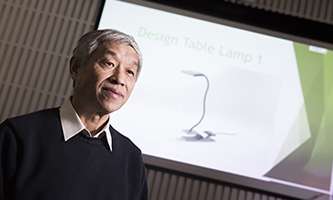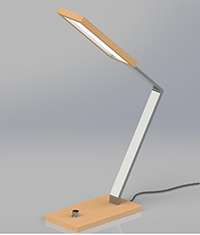Project lead Professor Daizhong Su. Credit: Nottingham Trent University
Researchers at Nottingham Trent University have developed a way to analyse online consumer reviews and social media to help designers create better informed products.
Led by design engineering expert Professor Daizhong Su, a research team used data mining techniques and produced an algorithm which identifies the most liked and disliked features of existing products, according to thousands of consumer comments on websites like Amazon, eBay, Facebook, YouTube and online stores.
The approach - which was developed using big data, data mining and related Internet technologies - detects keywords using automated online searches and informs designers of the successes and flaws of any given product.
"At our fingertips is an array of data which tells us the strengths and weaknesses of almost every product in the world," said Professor Su, of the School of Architecture, Design and the Built Environment.
"We've developed a way to harness this valuable information and created a powerful approach which could change the way we think about design.
"It has the potential to make tomorrow's products more innovative, user-friendly, sustainable and better informed of user requirements."
After keywords are entered, the computer program learns on its own and categorizes reviews, giving a breakdown of positive and negative comments on various products and their features. It also learns to disregard spam comments.
The final lamp design. Credit: Nottingham Trent University
To test the technology, the team designed a desk lamp as a case study based on more than 1,000 comments on existing designs on the market. The results showed that consumers liked desk lamps which were small, adjustable, bright but with a dimmer, that included a touch function, and more. Dislikes included unstable bases, poor reliability, dullness and excessive heat.
This feedback was used to set a range of specifications for a design to achieve. The final design included an on/off switch which controlled brightness, a sustainable bamboo base and LED casing, and a brushed aluminium neck with an adjustable arm.
The case study work was carried out with students on the European Region Action Scheme for the Mobility of University Students (Erasmus) exchange programme, which was organised by product design lecturer Martin Higginson.
Professor Su, who heads Nottingham Trent University's Advanced Design and Manufacturing Engineering Centre, said: "The case study – which is part of our on-going research in online data mining of consumer views - shows how innovative design can be achieved with a better understanding of consumer preferences.
"By gathering this valuable information about existing desk lamps, we've created a new design which does away with the common flaws of existing products and focusses on the features which are favoured by consumers.
"It demonstrates how the use of big data can help customise consumer preferences into the product development process, helping determine important design decisions to meet customer needs more accurately."
Provided by Nottingham Trent University























